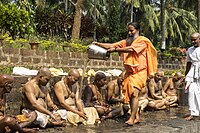
Photo from wikipedia
This article concerns African Christians’ attempts to accommodate traditional practices – in this instance male initiation – within their evolving Christianity. It speaks to an on-going concern around the place… Click to show full abstract
This article concerns African Christians’ attempts to accommodate traditional practices – in this instance male initiation – within their evolving Christianity. It speaks to an on-going concern around the place of custom in modern Africa and the uses to which custom and its invocation are put. Contrary to the literature, which locates the adaption of custom by Christians in the independent or Zionist churches, educated African Christians in the historic mainstream churches were also staunch defenders of customs antithetical to the white missionary establishment. Using a range of unexamined and Xhosa sources, the article considers how African Christians publicly contested initiation. Black South Africans used their literacy, writing ethnographies and letters to newspapers to debate custom and establish themselves as purveyors and readers of, firstly, locally circulated and, later, ethnographic knowledge. Christians engaged in spirited and learned discussions of circumcision, using a range of arguments based on custom and Biblical precedent. Xhosa men, in particular, called on ideas about initiation to defend masculine moral authority. Their arguments in defence of initiation point to anxieties over manhood and power in the context of an increasingly modern society. While initiation had particular meaning for Xhosa men, men across South Africa debated, defended and, at times, incorporated Christianised forms of initiation into their own symbolic repertoires.
Journal Title: Journal of Southern African Studies
Year Published: 2017
Link to full text (if available)
Share on Social Media: Sign Up to like & get
recommendations!